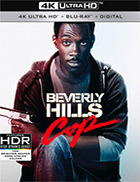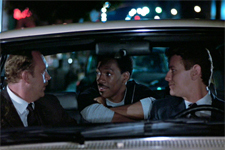| Director: Martin Brest | | Screenplay: Daniel Petrie, Jr. (story by Danilo Bach and Daniel Petrie, Jr.) | | Stars: Eddie Murphy (Axel Foley), Judge Reinhold (Det. Billy Rosewood), Lisa Eilbacher (Jenny Summers), John Ashton (Sgt. Taggart), Ronny Cox (Lt. Bogomil), Steven Berkoff (Victor Maitland), James Russo (Mikey Tandino), Jonathan Banks (Zack), Stephen Elliott (Chief Hubbard) | | MPAA Rating: R | | Year of Release: 1984 | | Country: U.S. |  |
|  Beverly Hills Cop, one of the first megahits of the early 1980s and the movie that catapulted Eddie Murphy into the Hollywood stratosphere, is all about attitude. It has to be: Short in the narrative department, filled with caricatures, and largely lacking in any real surprises, all it has is attitude. Its blend of comedy and violence was trendsetting, but its engine was fueled by Murphy’s comic-book self-assurance and laid-back, bad-ass attitude. He never flinches, he never quits, and he’s always primed with a witty quip or a sure-fire comeback—he’s the comedian as supercop (or is he the supercop as comedian?). Murphy stars as Axel Foley, a fast-mouthed, rule-breaking Detroit police detective who travels to the exotic land of Beverly Hills, California, in order to find out who killed his best friend, Mikey Tandino (James Russo). Foley is street-smart and down to earth, meaning he is immediately out of place in the posh world of Gucci, five-star restaurants, and red Porsches. In comedic terms, Beverly Hills Cop is an extended fish-out-of-water joke, except that the real joke is how well the fish ends up functioning on land. Axel never fits in, but that doesn’t stop him from winning in the end (and raising hell along the way). After meeting with an old friend named Jenny (Lisa Eilbacher) with whom Mikey used to work at an art gallery, Axel teams up with two reluctant, straight-laced Beverly Hills detectives, Sgt. Taggart (John Ashton) and Det. Billy Rosewood (Judge Reinhold). Taggart and Rosewood are conceived of in terms of Laurel and Hardy as an old married couple, and their domestic bantering shtick works largely in counterpoint to Murphy’s more aggressive techniques. “I’ve noticed you've been drinking a lot of coffee,” Rosewood points out gently to his older partner while they’re on a stakeout, “and I think that’s why you’ve had so much trouble relaxing.” The plot, originally written by Danilo Bach (April Fool’s Day) and then re-written by Daniel Petrie, Jr. (The Big Easy, Toy Soldiers), involves a drug-smuggling operation by Jenny’s boss, an uber-wealthy Aryan art dealer with cold blue eyes named Victor Maitland (Steven Berkoff, who memorably played the sneering Soviet villain a year later in Rambo: First Blood Part II). The plot mechanics are so uniformly simple (there are not even any attempts to thrown in red herrings or bad leads) that they cease to hold any interest, which opens the space even wider for Murphy to take over. Director Martin Brest, helming his second feature after the old-codger bank caper movie Going in Style (1979), was smart enough to understand the inherent weakness of the basic material he was working with and to allow Murphy to command the screen. For the most part, Murphy’s routine works, with his no-fear attitude and unrelenting confidence functioning as the ultimate parody of all pop-culture supercop clichés. Axel seems to exist in his own universe, which sometimes leads to scenes that don’t work all that well, such as one in which he gets a room at an expensive Beverly Hills hotel by causing a ruckus at the front desk. Not only is the scene terribly unimaginative (if all else fails, raise your voice), but it’s also quite unbelievable. In most other scenes, though, Murphy’s attitude and provocative improvisations carry the movie even when everything else around him fails. Since Beverly Hills Cop was a Don Simpson/Jerry Bruckheimer production, it also carries with it the trademarks of that illustrious producer-duo’s pioneering Reagan-era combination of high-tech violence with an irreverent attitude and a high-caliber soundtrack pulsing with Top-40 material (the pinnacle of which is 1986’s Top Gun). The urge to include all of the above makes for some awkward narrative ruptures, as the movie opens with a ludicrous chase sequence involving an 18-wheeler smashing through parked cars for no narrative purpose other than to show an 18-wheeler smashing through parked cars (ditto with the climactic shoot-out, which ups the ante by throwing in a couple of submachine guns). All of this, of course, is scored to a long parade of memorable synthesized pop rock, particularly Glenn Fry’s catchy title track “The Heat is On.” Beverly Hills Cop’s bizarre production history is perhaps even more fun than the movie itself. It began its long gestation in the 1970s as a vehicle intended for Al Pacino or James Caan, then got the green light with Sylvester Stallone attached as star, and finally wound up on screen with then-recent Saturday Night Live alum Eddie Murphy, who already had two certified hits with 48 Hrs. (1982) and Trading Places (1983) under his belt. Despite the number and variety of actors who were considered for the part of Axel Foley over the years, the movie is inconceivable without Murphy, who supplies attitude in spades to kick-start what is essentially a rote police procedural. | Beverly Hills Cop 4K UHD + Blu-ray + Digital | | | Aspect Ratio | 1.85:1 | | Audio | English DTS-HD Master Audio 5.1 surroundGerman Dolby Digital 2.0 surroundSpanish Dolby Digital 2.0 surroundSpanish Dolby Digital 5.1 surround | | Subtitles | English, English SDH, French, German | | Supplements | Audio commentary by director Martin BrestDeleted scenes“Behind the Scenes: 1984 Interviews”“Beverly Hills Cop: The Phenomenon Begins” featurette “A Glimpse Inside the Casting Process” featurette “The Music of Beverly Hills Cop” featuretteLocation Map (7 production design mini-featurettes) Photo galleryOriginal theatrical trailerBHC Mixtape ’84 | | Distributor | Paramount Home Entertainment | | Release Date | November 24, 2020 | | | COMMENTS | | Beverly Hills Cop has been given a new 4K transfer, which we previously saw in reduced form on the Blu-ray Paramount released in January, but now get to see it in its full 2160p Dolby Vision glory. The film benefits substantially from the enhanced high-definition resolution and maintains a distinctly filmlike appearance. The enhanced resolution only clarifies the filmic presentation and makes the detail that much stronger. The image is clean, with good color saturation and natural skin tones. The lossless DTS-HD Master Audio 5.1 surround mix, which is the same we heard on the Blu-ray, sounds great. The mixes are clean and nicely separated among the multiple speakers, putting out a rich, full sound with a good bass level. The Beverly Hills Cop disc emphasizes the film’s music quite substantially; as music editor Bob Badami explains in one of the included featurettes, he and director Martin Brest intended for the music to drive the action, rather than the sound effects. Thus, during the 18-wheeler sequence at the beginning, the sound effects of crashing metal and breaking glass are notably subdued while the Pointer Sisters’ “Neutron Dance” dominates the aural space. This is not a mistake during the remix, but the intended sound of the movie. All of the supplements from the Blu-ray released earlier this year are included here, and most of those were previously available on the 2002 “Special Collector’s Edition” DVD and then recycled on the 2011 Blu-ray. There are a few new additions, though, including two deleted scenes, both of which take place before Axel goes to Beverly Hills: one in which he visits with a Detroit crime boss to question him about Mikey’s murder and one in which he packs his bag and then drives off into the night. Both scenes look a bit rough and were clearly cut early in the editing process because they have no sound editing. There are also 7 minutes of video interview clips with Eddie Murphy and director Martin Brest recorded in 1984 that are padded out with clips from the film. The last addition is “BHC Mixtape,” which simply allows you to jump to the scene in the movie featuring one of six songs (“The Heat Is On,” “Neutron Dance,” “Do You Really,” “Stir It Up,” and “Nasty Girl”). Everything else on this disc we’ve seen and heard before, starting with director Martin Brest’s screen-specific audio commentary, which is unfortunately a bit sparse. Brest has some interesting comments and behind-the-scenes tidbits, but there tend to be large gaps where he doesn’t have anything to say. Next up are three featurettes on different aspects of the movie. The longest of the three, “Beverly Hills Cop: The Phenomenon Begins,” is a 29-minute making-of featurette that includes interviews with a large cross-section of the cast and crew, including Brest, coproducer Jerry Bruckheimer, screenwriters Daniel Petrie, Jr., and Danilo Bach, editor Billy Weber, and actors Judge Reinhold, John Ashton, Lisa Eilbacher, and Ronny Cox. Eddie Murphy does appear in the featurette, but his contributions consist of about a minute of footage that was borrowed from an interview session for some other movie. Subjects covered here range from Sylvester Stallone’s involvement in the project, to reminiscences of the late Don Simpson, to how Reinhold and Ashton improvised much of their material during casting try-outs. “A Glimpse Inside the Casting Process” runs just over nine and a half minutes and focuses on an interview with casting director Margery Simpkin and how she went about casting all the various roles (Brest, Reinhold, Ashton, Eilbacher, and Cox also appear briefly in interviews). Lastly, there is “The Music of Beverly Hills Cop,” a featurette in which music editor Bob Badami talks about how he and Brest conceived of the soundtrack and where some of the various songs came from (other contributors here include Brest, Bruckheimer, and Reinhold). “Location Map” is a collection of seven 1- to 2-minute mini-featurettes in which production designer Angelo Graham talks about what was involved in creating the various locations, including the Beverly Hills police station, Victor Maitland’s mansion, the Biltmore, the warehouse, the art gallery, the Harrow Club, and the strip club. Unfortunately, this does not include any behind-the-scenes footage or production photographs, but Graham is good about explaining the processes involved in taking actual locations and making them work for the movie. Lastly we have an original theatrical trailer. |
Copyright © 2020 James Kendrick Thoughts? E-mail James Kendrick All images copyright © Paramount Home Entertainment |



 (3)
(3)

